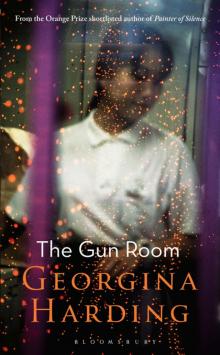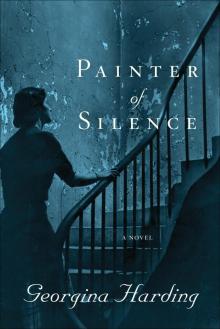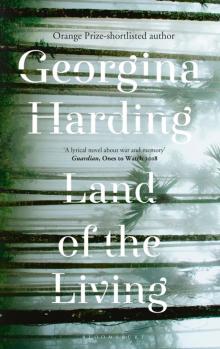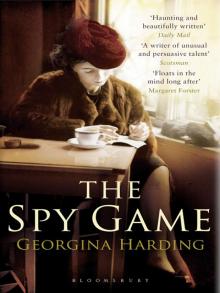- Home
- Georgina Harding
Land of the Living Page 2
Land of the Living Read online
Page 2
The Englishman stood beneath a black umbrella and watched them come. Tall, long oval face, small greying moustache, stillness in his eyes. The Deputy Commissioner had chosen to remain with the soldiers all through the siege. Men said that he had been at the Somme. So all this must have been familiar to him. Who would have thought to see such a thing twice in his life?
Each morning of the siege, they said, the Deputy Commissioner had gone out from his bungalow, and even after, when the bungalow had been fought through, ruined, razed to the ground, and made the rounds of the trenches cut across what had been his tennis court and his lovely garden filled with exotic shrubs, and greeted them all, a straight-backed administrator in creased and muddied civvies; and if such a man was there, and if such courtesy continued, then surely the war would be won and the Empire would persist? He walked always with a Naga by his side, a wiry man of eccentric dignity wearing a red blanket and carrying a spear.
The Somme was bigger. This battleground occupied only a fraction of the area of the Somme, but it was a place of mountains, nothing like Flanders. No one man on the flat ground of the Somme saw the full scale of the horror. You had to be a pilot or a crow, dead maybe, to rise above and see the whole. Here even a living soldier might see the panorama, first from the distant pass then again, closer in, from one of the ridges, from the heights of the Naga Village. A soldier in the Naga Village might see what a crow would have seen of the Somme, and see the black birds also, the vultures and the big black Asian crows, above and below him, wheeling over the torn earth, the splintered trees, the craters, the smashed lines of trenches, diving to scavenge once the gunfire and the blasts had stilled.
You’re sitting in the dark.
I was watching the fire.
Did you finish the Five Acre? She put on the lights. She had taken off her apron and smoothed her hair.
Yes, we got it done. I let the men go off home early. Wasn’t worth starting anything else today.
I went for a walk this afternoon, she said. Down to the village.
Did you take Jess?
Of course, I wouldn’t go for a walk without her.
But Jess was Charlie’s dog. Jess had been Ralph’s dog and now she was Charlie’s. Claire took her for walks, out down the track to the village and the shop, to the post office today and to the churchyard and Ralph’s grave, and Jess came with her, but soon as Charlie came in it was clear whose dog she was, lying now gazing at him as he gazed at the fire.
The silence opened up again. Claire’s voice came light over the crack of a burning log.
I saw you ploughing. You had company. The gulls.
There must have been hundreds of gulls behind the plough, circling, landing, spreading like a white wake behind the furrows. These sights were still new to her. She had not lived properly in the country before she came to the farm.
Does one call them a flock? Does one speak of flocks of gulls?
Gulls don’t act like a flock, he said. They’re out for themselves.
She didn’t know how you could hate the birds. How they had shot the crows for what they had seen them do.
When Charlie had nightmares she felt the sweat on him. She reached out, passed her hand down his slippery body. The smell of him was sharp in the bed. By morning when she had slept again it hung about the sheet and the hollow of his pillow. He had got up though it was still dark and there was no work to do, though it was dark and raining and he knew he would not be able to get on the land that day or perhaps for some days to follow. She heard him moving about in the kitchen and making tea, stoking up the Aga with coal – that a chore she was grateful he took to himself – and after a little while she would get up, and strip back the sheets to air the bed.
He was no longer a soldier when they married. She had thought to have walked out of the church as her friends had done in those other weddings that followed the war, with a man in uniform tall beside her, walking out beneath an arch of crossed swords held above their heads by comrades-in-arms. But Charlie was in mufti already, if a soldier inside, standing straight as a soldier, his arm beneath hers rigid as steel. There was the photo, in a silver frame on the chest of drawers by the window, he straight and handsome in his morning coat, she with her veil blowing across her. The wind had taken her by surprise as they came out of the church door, caught her veil and her dress. Because it was a winter wedding she had held only a tiny bouquet of gardenias. They were grown in some hothouse, waxy, perfumed, exotic. Charlie bent to the scent of them as he took her arm and she had wondered if it was a mistake and they reminded him of the jungle.
They had come here sooner than they had intended, hurried by Uncle Ralph’s illness. There had been an urgency to make the move and take on the farm. Again, a wind, a kind of surprise, and they had found themselves here, full stop, the two of them at once living these fixed adult lives. But that was what one did, nowadays, wasn’t it, now that the war was over and life lay so plain ahead? That was peace, wasn’t it, what everyone wanted, the point of it all? One settled down and learnt to cook and started a family, and made the world a steady place. She lay in this bed, in this room which would be their room for years ahead. They had chosen this room though it had been the spare room before, since it would not have felt right to move into Ralph’s. Ralph’s room could be the spare one now, the other bedrooms one day children’s rooms. Perhaps this was the better room anyway, at the centre of the formal front of the house with its view that already she knew so well, out over the flat fields to the south. Alone in the bed she listened to the sound of rain, on the roof and in the gutters and on the trees. This rain had come with the morning. It hadn’t been raining when they woke in the night. Would the leaves go from the trees now, or would it take a wind to set them falling? There had been no wind this autumn which was why the leaves had stayed so long. Such a mild autumn it had been, people said when she met them in the village, the colours were especially pretty this year. There had been no wind, and no rain either, so Charlie had been out in the fields. Now with this rain he would be in the house. She felt the rain enclosing them both.
A mercy that it had been so mild, they said. The wind here could be bitter. Yes, she said, she knew that. She remembered that cold snap in the spring. Frost got the blossom, they said, that was why there weren’t apples on the trees. Ah, of course, she hadn’t thought of that, she was a city girl and thought apple trees had apples the same every year, rosy amongst their leaves. So new she was here, and no one saw that. There was a lot for her to learn. The wind here came off the North Sea, like the gulls. It came from the North Sea and the Arctic or the Urals. She did not expect that the gulls would be coming today. The fields would lie wet and brown and untouched, and the sky would not lift above them.
She wished now that there would be wind, even if this would mean the loss of the leaves.
He had made tea, put the pot warm at the side of the stove, sat down himself at the table.
Dismal day.
Well it’s nearly November.
When do the clocks go back?
Next weekend, I think.
She poured herself a cup and looked about as if for escape.
I thought I’d go into Swaffham. Is there anything you need?
Early closing today.
Then I’d better go soon.
All the land grey through the windscreen, the road shining grey, the wipers insistent across the glass. The great wide market square almost empty in the rain. She parked, took up her basket, put up her umbrella as she got out of the car. She had forgotten what in particular it was that she had meant to buy. The rain didn’t cease nor so much as lessen all the time that she spent in the town. The few shoppers about seemed blind hunched figures in raincoats or under umbrellas. The lights were on in the shops, a red glare to the meat in the butcher’s window, a white sheen to the fish in the fishmonger’s.
The town itself seemed laid out on a wet slab. She went past without buying, went on to the grocer’s where the tins with their c
oloured labels were piled high in pyramids, tinned pineapple, sweetcorn, treacle, peas, Carnation milk, Ambrosia creamed rice. If she were to take a single tin from the base of each pyramid the whole shop would come clattering down about her, a shining gaudy earthquake of tins bouncing and crashing and piling, some of them stalling at her feet or rolling right across the floor to rest at the base of the counter. And she would stand still in the middle of it with her basket while the grocer in his long brown coat came running.
Just one tin of tomatoes, please, Mr King, she would say, And some lavatory paper. And a quarter pound of Cheddar.
Shangri-La
He didn’t begin to tell her anything like a story until they were settled. Not even quite then. Not until they were settled in the house and the work outdoors was done – or almost done, done so far as it could be, for he was learning that the farm work was never finally done – until all those things were done and time had passed. He was aware that she was waiting. They were all waiting, the people who had been home through the war. He had seen that. They were waiting, and they pounced on information when it came out, as if they wanted to know it all. But they didn’t really want that. They wanted the story but not the truth. That would be better for them. If they had only that, then they could put it in black and white, and lay it aside and call it history, and go back to their lives, and life could go on much as it had gone on before. The waters would close, and those who had come back, who knew the difficult things, would be only driftwood bobbing about on the surface. With time the water might seep into the wood, and make it sodden and heavy. With enough time it might begin to sink, to the mud at the bottom.
And then the water would be clear.
Claire, there was a Shangri-La. He could tell her this. This was a piece of the story that could be told, that she would be happy to be told, this piece that told how he survived.
He began to tell her at night in the dark, or when they went for a walk together on a Sunday afternoon. That was the best time to talk, when they were out on a walk, their eyes not on each other but on the fields, or on the dog as it ran ahead or snuffled in the grass, not touching but side by side so that they might almost touch, he inclining his head towards hers, stooping slightly since he was so much taller.
After I lost the others, when I was alone, I walked some days and came to a green valley. I saw it like a mirage, between the opening and the closing of the clouds.
When he looked up through the great tree he saw sky. For most of these days there had been no sky but only rain, and if not rain then cloud, which he told himself might itself be sky, he was at such altitude that he might be walking in the sky. But what he saw up there beyond the branches was distant, blue, beyond his touch. It drew his vision until he felt that he was falling away from his eyes.
He put out a hand to steady himself. The tree’s trunk was vast, the bark hoary with moss and fern. If the boys had been here it would have taken two or three of them to reach around it. Not Walter. Walter would have been sitting between the roots having a smoke, taking his watchful rest, Walter always watchful even when he seemed most relaxed; it was his job, he used to say, it’s when a man stops that he hears the twigs crack.
Look at this tree, Walter, how old it must be.
Walter missing Virginia tobacco, grimacing at the dung-taste of the Indian bidi. Aye, but likely it’ll be holler, holler as a hatbox inside.
With age it was no longer a single trunk but a mass of multiple trunks and roots like elephant’s legs, welded together to support and guy the great weight and height of the tree above. As his eyes moved up the trunk he noted scars like swollen lips where past branches had been torn away. Storms must have struck this tree hard, so high it had stood and for so long on the blade of this ridge, exposed above the rest of the jungle.
This tree must mark the horizon for miles. That would be why the paw was hung there, some territorial sign in it, though Walter might say it was just to scare the vermin. Or the poachers.
But Walter, from this tree one could see for miles.
Better be climbing it then, sir. (The way he said ‘sir’ it might have been ‘lad’, something paternal about Walter though he was hardly more than ten years older.) That is, if you’re wanting to see where you are.
Looking at the scars he could see that when the tree was in its prime it would have been possible for a man to climb all the way to the canopy. Now it was so broken he could climb only as far as that first great overhanging branch, as the man must have done who strung up his trophy, the barefoot hunter who had come before.
No need to go further than that. That branch would be high enough.
He rested his rifle in a corner between two roots, removed his boots and laid them alongside. Scaling this broad first section of trunk was like climbing an almost perpendicular rock, finding grips in the crevices and folds, testing if the root ball of a fern could take his weight, at last hoisting himself up and astride the branch. It was broad enough to walk along. He imagined that the hunter would have done that, his bare brown feet light and sure, slightly splayed across the curvature, but he did not trust himself, not now, not in his current condition. The effort of the climb alone had left him dizzy. He rested awhile and collected himself, seated with his back to the trunk, then began to edge along, using his two hands to take his weight as he shifted his body forward. It was not so easy as it had seemed, because of the ferns and because of all the bamboo spikes stuck into the wood, spikes which must have been attached to other trophies long since removed or scavenged. So long this tree had stood here and men had passed beneath it, and men had done their killing and left their signs about the forest. He took himself out along the branch as far as the place where the thing was hung, from where the view was clear.
The jungle ahead fell away from the ridge as steeply as the way he had come. He saw how the dark crowded forest canopy dropped away into cloud, rising again from the cloud to another ridge and yet another, as, looking back, he saw the dark waves of it behind, the successions of hills and cloud and valleys in which for days he had been submerged. It seemed endless, this jungle and these hills, as if the blue line of the furthest ridge he could see, if he were to reach it, were only to be replaced by an infinity of ridges beyond. As he looked the cloud was moving, massing and breaking, skeins of it detaching and pulling away, rents appearing, skeins swirling back over the rents. He watched the moving cloud. And then for a moment as the cloud parted he glimpsed a break in the jungle on the opposing side of the valley: first an opalescence and then a glimpse of vivid green, a notion of order, that vanished as soon as he saw it.
He needed to be higher if he was to see lower, if the cloud was to part again. If he was to see right down into the valley.
Slowly, he raised himself to a standing position, pulling up first one foot and then the other until he was crouching, steadying himself with his hands, then straightening to find his balance on the branch, and as he did so the cloud at last broke apart and rolled up out of the valley altogether. He took this as a portent, the first sign of hope that he had seen in all these days. Beneath him, where seconds before there had been nothing but cloud, was an orderly landscape of rice terraces, greener than he could have imagined any green to be, tier upon tier of green terraces, neatly scalloped and composed about a shining ribbon of river.
He couldn’t say how long the vision lasted. Only that the clouds spilled back heavier and darker than before and it was gone, but now looking across at the nearest ridge, where the jungle also had become darker and blacker with the change in the cloud and the approach of rain, he thought that he could make out what must be a village – no strange light on it, no mirage, but the plain straight lines of roofs amongst and above the dark jumble of trees, the only lines that were straight in all of this landscape, but so subtly defined that he would not have noticed if he had not seen the signs of cultivation first and had cause to look.
There was rain coming, Claire, more rain. The monsoon rain came in so s
uddenly up there, it was so sudden and so hard that the world could change in an instant. I think it must be one of the wettest places in the world, Claire, you can’t imagine so much bloody rain, falling all at once, and it’s so high there in the hills that often the rain turns to hail, with hailstones so heavy that people say they can kill an animal caught out in the open. This day there wasn’t any great storm but it was torrential all the same, rain that made the way down slippery and blind, even within the forest, the water pouring down my cape, the path washing away ahead of me, so that I was sliding about blindly where the water went, unable to see more than a few yards ahead. I knew I wouldn’t make the village by that night.
So long he had kept from telling. So much he might say, once he began to tell.
Time now in a farmer’s winter. Land too wet to work. Days closing in. Their walk would end at four when it was already almost dusk. Then they go would in, and later there would be the fireside. The sort of silence in which men used to sharpen tools and whittle pieces of wood. And tell stories. Or women stitch. (Though Claire wasn’t somehow the kind of girl he could picture doing that.)
Only the two of them. No world pressing in.
This was a regular walk that they would do. They opened a gate. Closed the gate. Walked on, along the edge of a field and through a narrow strip of woodland. A clay pit there, a deep dark little pond, and brambles about it. The dog disappeared into the wood. They waited, when they came out from the trees, as he whistled for the dog.
I did not even come to the fields at the base of the valley until just before sunset, when the rain cleared, as it does so often in the evening, and there was colour in the sky.

 Harvest
Harvest The Gun Room
The Gun Room Painter of Silence
Painter of Silence Land of the Living
Land of the Living The Spy Game
The Spy Game The Solitude of Thomas Cave
The Solitude of Thomas Cave